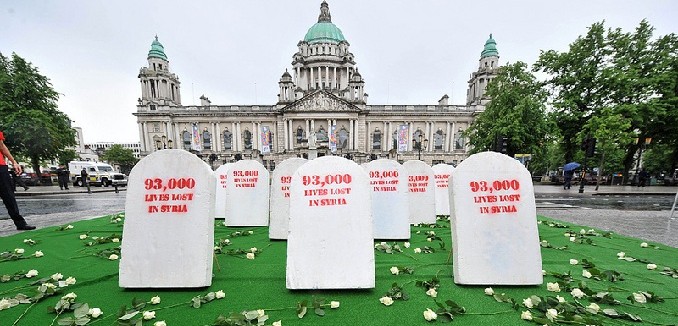Though the U.N. has asked the parties backing the various entities in the Syrian conflict to stop injecting weapons into the violent war. The parties backing the various entities in the Syrian conflict seem to have declined to acede to the U.N.’s request:
Heavy fighting resumed around the northern Syrian town of Aleppo, where rebels, buoyed by Obama’s decision last week to arm them, tried to block an advance into the north by President Bashar al-Assad’s forces, who are supplied by Moscow. In new evidence of growing foreign support for the rebels, a Gulf source told Reuters Saudi Arabia had equipped fighters for the first time with shoulder-fired anti-aircraft missiles, their most urgent request. Rebels said Riyadh had also sent them anti-tank missiles… After months of indecision, the Obama administration announced it would arm the rebels because Assad’s forces had crossed a “red line” by using nerve gas. That has put Washington on the opposite side of the two-year-old civil war from its Cold War foe Moscow, which supplies weapons to Assad.
It is unclear if the Saudi move to arm the rebels was encouraged by the American decision to support the rebels openly. Another report identifies identifies France as facilitating weapons transfers:
The shoulder-fired weapons were obtained mostly from suppliers in France and Belgium, the source told Reuters. France had paid for the transport of the weapons to the region. The supplies were intended for General Salim Idriss, leader of the Supreme Military Council of the Free Syrian Army (FSA), who was still the kingdom’s main “point man” in the opposition, the source said. The Gulf source said without elaborating that the kingdom had begun taking a more active role in the Syrian conflict in recent weeks due to the intensification of the conflict.
Meanwhile at the G8 summit – where Presidents Barack Obama and Vladimir Putin held a chilly summit – there was no specific mention of Syrian ruler Bashar al-Assad or his Hezbollah in the final summit communique [PDF]:
We reiterate our condemnation of terrorism in all its forms and manifestations, and wherever it occurs. We remain concerned about the increasingly fragmented and geographically diverse threat posed by terrorist groups including al-Qaeda and its affiliates. None of us are immune: since Camp David every G8 partner has been directly affected by acts of terrorism, either at home or overseas. We recognise the valuable leadership role of the UN, including through its Global Counter Terrorism Strategy, the work of the Roma Lyon Group and the importance of the Global Counter Terrorism Forum (GCTF). We are committed to working together to reduce the risk of terrorism for our own citizens, including from home-grown terrorism, and for our partners overseas. Our response must be robust, intelligent and based on a comprehensive approach, respecting human rights and the rule of law, which counters radicalisation, violent extremism and terrorist financing (including flows channelled through off-shore jurisdictions), and which tackles the conditions and grievances that terrorists seek to exploit.
The vague wording of the statement was taken as evidence that Russia had vociferously defended the Syrian regime, to which it provides material, diplomatic, and logistical support.
[Photo: Oxfam International / Flickr]




